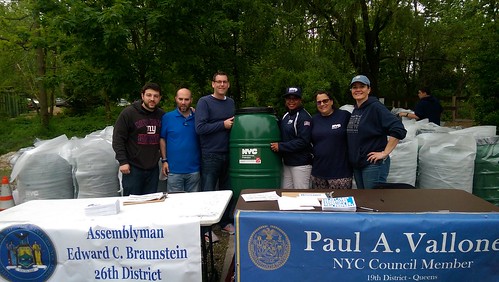FOR IMMEDIATE RELEASE 16-45 May 23, 2016 Contact: deppressoffice@dep.nyc.gov (718) 595-6600 DEP Joins Council Member Paul Vallone and Assemblyman Edward Braunstein to Distribute Rain Barrels to 240 Homeowners in Douglaston, Little Neck and BaysideRain Barrels Collect Precipitation, Reduce Residential Water Bills and Help to Protect the Health of Alley Creek and Little Neck BayPhotos of the Event are Available on DEP’s Flickr PageThe New York City Department of Environmental Protection (DEP) on Saturday joined New York City Council Member Paul A. Vallone and New York State Assemblyman Edward C. Braunstein to distribute rain barrels to 240 homeowners in the neighborhoods of Douglaston, Little Neck and Bayside. The 60-gallon rain barrels are easy to install and connect directly to a property owner’s downspout to capture and store the stormwater that falls on the rooftop. The water collected in the rain barrel can then be used to water lawns and gardens, or for other outdoor chores. Rain barrels can help reduce a homeowner’s water bill as watering lawns and gardens can account for up to 40 percent of an average household’s water use during the summer months. They also help to reduce the amount of stormwater that enters the City’s sewer system, which helps to protect the health of local waterways including Alley Creek and Little Neck Bay. Over the last several years, DEP has distributed more than 5,100 rain barrels to New York City homeowners. Saturday’s event was held at the Alley Pond Environmental Center in Little Neck and the rain barrels were provided free of charge. “Rain barrels are an environmentally friendly and economically sound addition to anyone’s home. They help to save both water and money,” said DEP Acting Commissioner Steven Lawitts. “The captured rainfall eases the amount of stormwater flowing through our sewer system, thereby improving the health of Alley Creek and Little Neck Bay. “As Council Member, bringing relief to our homeowners is one of my highest priorities. Now that we were able to distribute these rain barrels, our constituents will save money on their water bills while also committing to a greener city, said Council Member Paul Vallone. “I thank the Department of Environmental Protection, Assemblyman Edward Braunstein and Alley Pond Environmental Center for partnering with our office on such a successful event.” “Thank you to DEP for partnering with Council Member Vallone and my office to provide free rain barrels to our constituents,” said Assembly Member Edward Braunstein. “As soon as we announced the event, we received an overwhelming response from the residents of northeast Queens who were excited to receive a free, environmentally friendly rain barrel which will help to lower their water bills.” DEP’s Rain Barrel Giveaway Program is part of New York City’s Green Infrastructure Plan that aims to capture stormwater before it can ever enter the sewer system and thereby reduce combined sewer overflows into local waterways. DEP has committed to invest $2.4 billion in green infrastructure projects as well as other source controls, such as rain barrels, to significantly reduce combined sewer overflows by 2030. The rain barrel program also builds upon DEP’s efforts to conserve water as part of a $1.5 billion initiative to ensure clean, reliable, and safe drinking water for more than nine million New Yorkers for decades to come. As part of this initiative, DEP has begun a project to repair leaks in the Delaware Aqueduct that supplies roughly half of the city’s daily drinking water. In order to complete these repairs to the Aqueduct, the tunnel must be temporarily shut down in 2022. Ahead of the planned shutdown, DEP aims to reduce citywide water consumption by five percent. In addition to encouraging homeowners to conserve water, DEP is installing activation buttons on spray showers at 400 playgrounds around the city that will save 1.5 million gallons of water a day during the summer months. Work is also underway to install new, high efficiency fixtures in the bathrooms of 500 City schools to reduce water consumption by nearly 4 million gallons each school day. And, DEP has partnered with hotels, restaurants and hospitals across the city to reduce water use at these facilities by five percent annually. Installation of rain barrels is easy and they require little maintenance. Each homeowner who received a rain barrel on Saturday was provided with an installation kit and instructions. Rain barrels should only be used for non-potable purposes, such as gardening, and must be disconnected from the downspout during the winter months to avoid freezing. DEP manages New York City’s water supply, providing more than one billion gallons of water each day to more than nine million residents, including eight million in New York City. The water is delivered from a watershed that extends more than 125 miles from the city, comprising 19 reservoirs and three controlled lakes. Approximately 7,000 miles of water mains, tunnels and aqueducts bring water to homes and businesses throughout the five boroughs, and 7,500 miles of sewer lines and 96 pump stations take wastewater to 14 in-city treatment plants. In addition, DEP has a robust capital program, with nearly $14 billion in investments planned over the next 10 years that will create up to 3,000 construction-related jobs per year. This capital program is responsible for critical projects like City Water Tunnel No. 3; the Staten Island Bluebelt program, an ecologically sound and cost-effective stormwater management system; the city’s Watershed Protection Program, which protects sensitive lands upstate near the city’s reservoirs in order to maintain their high water quality; and the installation of more than 820,000 Automated Meter Reading devices, which will allow customers to track their daily water use, more easily manage their accounts and be alerted to potential leaks on their properties. For more information, visit nyc.gov/dep, like us on Facebook, or follow us on Twitter. | ||
